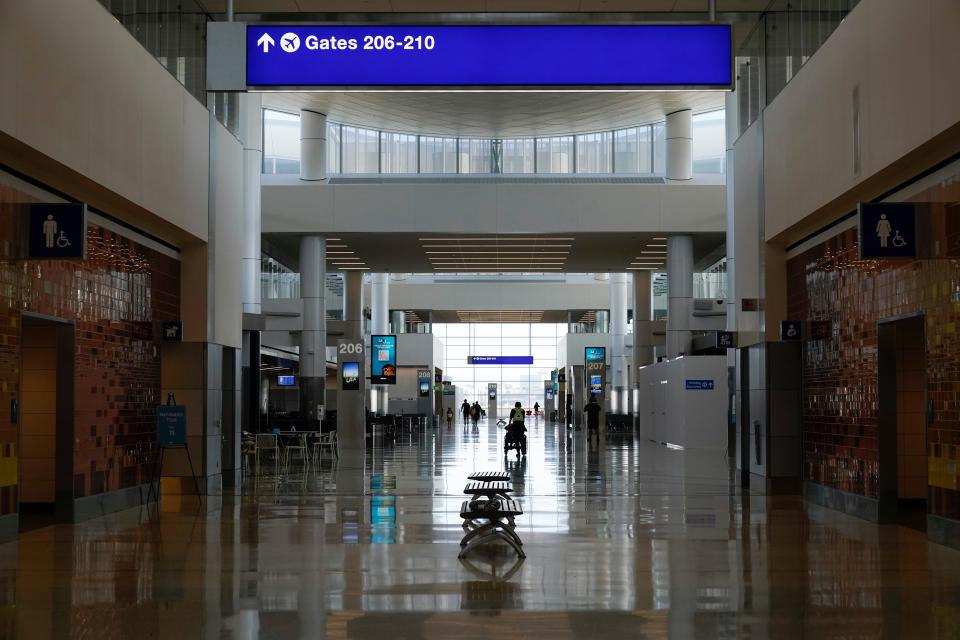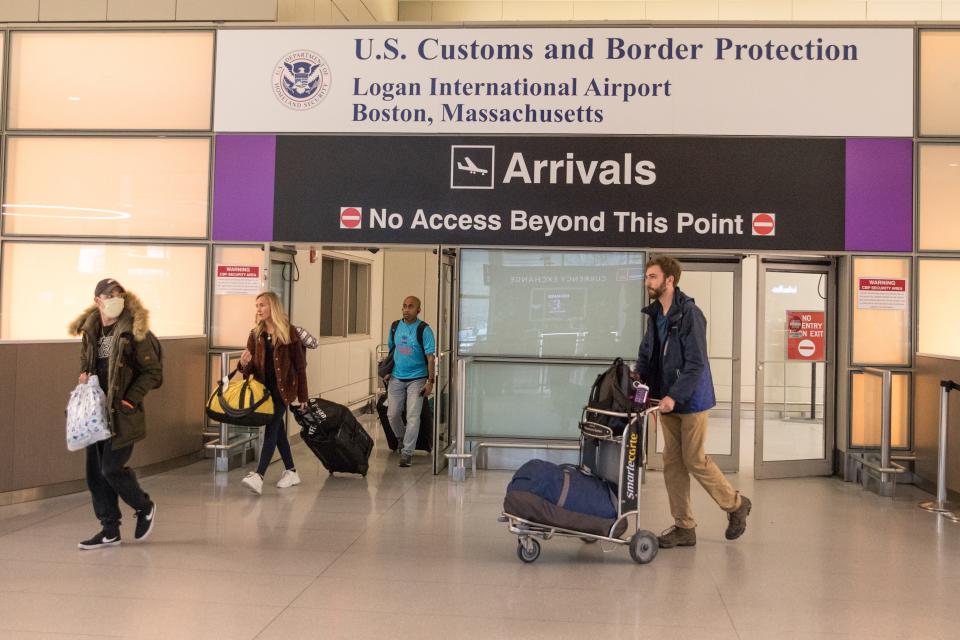Supreme Court asked to decide when travelers' phones, laptops may be searched at border

WASHINGTON – Diane Zorri was about to get her passport stamped at Miami International Airport when a customs agent approached with an ominous declaration.
"He said, 'hey, we've been waiting for you,'" Zorri recalled of the 2017 incident, in which she was led into a small room for questioning after returning to the United States from a vacation in Italy. "The first thing that rushes through my mind is 'was my family murdered while I was on the plane and they're here to tell me about it?' I was horrified."
Zorri’s family was fine, but U.S. Customs and Border Protection agents demanded that the Florida professor and former Air Force captain unlock and hand over her iPhone and MacBook laptop. The officers kept the devices for nearly an hour as others questioned Zorri. They then returned them – and let her go – without explanation.
"The initial emotion is just sort of shock," Zorri said. "I'm also thinking, you know, this isn't right because while I want to trust the government, there are a lot of things on your phone you don't necessarily want the whole government to know."
Zorri is now one of eight plaintiffs in a lawsuit at the Supreme Court challenging warrantless searches of phones and other devices at the U.S. border. The justices are set to consider whether to take the case, and another one raising similar questions, when they meet Thursday for their final conference of the current term.
Search it up: U.S. customs can seize phones without a warrant at U.S. border
Bathroom battles: Case of trans teen is back at Supreme Court
U.S. Customs and Border Protection reports it performed 40,913 so-called basic searches of electronic devices in 2019, a 22% increase from the prior fiscal year. Those searches involve an officer looking through a phone – reading emails, texts and calendar items – without the help of third-party software. The agency doesn’t track more advanced searches that involve connecting a phone to a computer for analysis.
Appeals courts have offered varying views on how much authority border officials have to search electronic devices, meaning that an international passenger entering the United States at Boston Logan International Airport faces a different set of rules than if that same passenger touches down in Los Angeles.
The Justice Department didn't respond to a request for comment, but the government told the high court in May that federal agencies "enforce a wide range of federal laws at the border" and said that the court's precedents permit the device searches. The Biden administration also said that the plaintiffs have not established what happened when agents seized their phones.
"Petitioners have instead provided only cursory descriptions of the manner in which their devices allegedly were searched," the government told the justices. "Indeed, some have simply asserted, without elaboration, that that CBP officers 'searched' their cell phones."
U.S. Customs and Border Protection declined to comment on the specific cases at the Supreme Court, noting it does not comment on pending litigation. In a statement, the agency said searches have helped to detect terrorist activity and thwart international crimes.

'Breathtaking' vs. 'unworkable'
Law enforcement generally must obtain a warrant to conduct a search under the Fourth Amendment's prohibition on "unreasonable searches," but there are exceptions. And one of those exceptions is found along the nation's borders.
For decades, federal courts have recognized the government has an interest in protecting its "territorial integrity" and has held Americans have less robust privacy rights when they step off an international flight than when, minutes later, they drive off from the airport.
"The Fourth Amendment balance between the interests of the government and the privacy right of the individual is also struck much more favorably to the government at the border," the high court wrote in a 1985 decision.
But the American Civil Liberties Union, one of the groups involved in the Zorri case, argues that phones, computers and other devices chock full of personal information should be subject to a higher standard than a passenger’s luggage.
The Supreme Court has limited the power of police to search electronic devices before. While police officers may search a suspect without a warrant during or immediately after an arrest, the Supreme Court held in 2014 that those searches do not allow a police officer to poke around in the phone a suspect was carrying when they were handcuffed.
Civil rights groups want the Supreme Court to set a similar clear, national standard for when border officials may initiate a search of a device. That could include probable cause that a crime was committed, the standard police use to make arrests and obtain search warrants, or reasonable suspicion, a lesser standard that police use to pull over drivers or pat suspects down.
Another question pending at the Supreme Court in a related case: What sort of evidence may border officials obtain from a phone or computer once a search begins? Some lower courts have held agents may only collect and use evidence of contraband on the phone itself – such as child pornography. That would put an email that describes where a smuggler has hidden physical drugs off limits, for instance.
The Biden administration told the court in January that such a standard would produce "illogical and unworkable results." But Nate Wessler, an ACLU attorney, said the government’s position gives border officials "breathtaking power" to review financial data, medical information, emails and photos of passengers returning from abroad.
"The government's position is that old cases that allow searches of physical luggage at the border can also provide carte blanche to search our phones and laptops anytime the government wants," Wessler said. "That just can't be."

Varying rules
If Zorri had landed in Los Angeles, customs agents could have conducted a basic search of her phone for any reason but would have needed reasonable suspicion of a crime to connect her phone to a computer for a deeper analysis. The San Francisco-based U.S. Court of Appeals for the 9th Circuit also ruled in 2019 that any search – basic or forensic – must be limited to looking for digital contraband on the phone itself.
But if she had landed at Dulles International in Virginia, agents could conduct a forensic search if the justification had something to do with smuggling, national security or transnational crimes. That standard was set by the appeals court in Richmond, Virginia.
In Miami, which falls under the purview of the U.S. Court of Appeals for the 11th Circuit in Atlanta, customs officials may perform basic or forensic searches on electronic devices at will – and they need not limit that search to digital contraband.

The varying standards are partly why civil liberties groups hope the Supreme Court will take up the issue. If they do, a decision would not be likely until sometime next year.
Zorri is a professor of security studies and international affairs at a university in Daytona Beach. She speculated that customs agents may have been interested in research interviews she conducted in the Middle East. But if that is the case, she said, her research is available online and could have been obtained with a far less invasive type of search – on Google.
Zorri said she wasn’t uncomfortable with the search because she was hiding some secret related to national security. Instead, her phone contained conservations with her husband about adopting children – something she hadn’t yet discussed with the rest of her family.
"I feel like, OK, I don't have anything to hide,” Zorri said, "but I’m not Kim Kardashian, either."
This article originally appeared on USA TODAY: Supreme Court asked to consider limits on phone searches at border

 money
money 